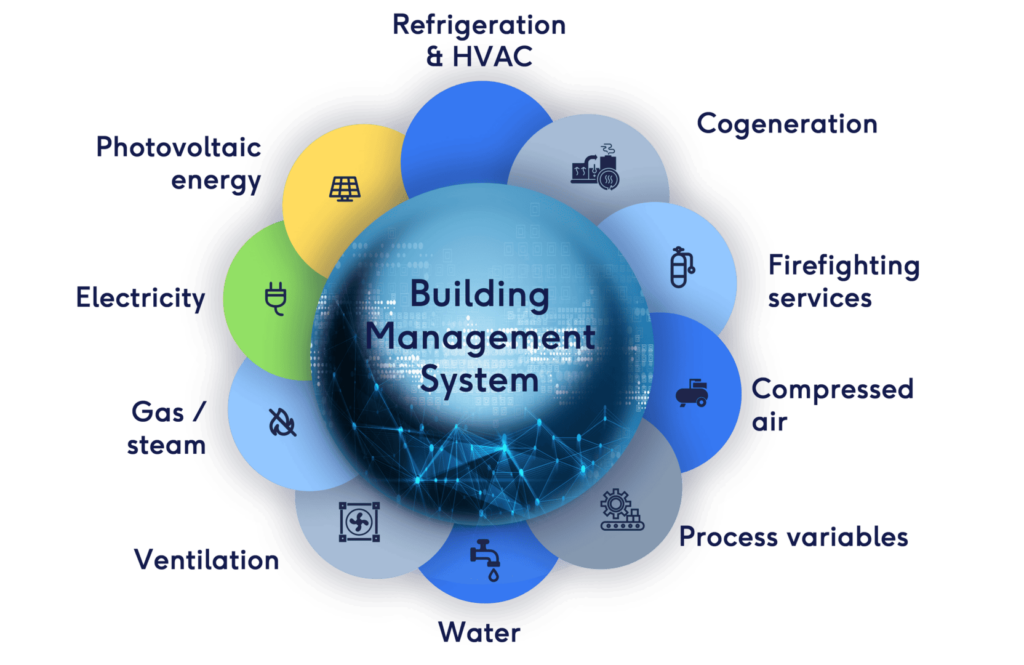Efficient resource control in industrial facilities is a constant challenge, driven by the growing need to reduce energy consumption, optimize operations, and comply with environmental regulations. These demands push companies to seek advanced technological solutions. In industrial settings, where buildings require more complex management due to diverse installations and machinery, a tailored Building Management System is essential. A Building Management System enables centralized monitoring, management, and enhancement of facility performance.
These systems are constantly evolving, integrating advanced automation, predictive maintenance, and data analytics, elevating the concept of industrial smart buildings to new heights.
Definition of Building Management System
A Building Management System is a centralized platform that integrates and allows supervision and control of various systems and installations within a building. In industrial contexts, a BMS Software plays a strategic role, addressing the high complexity of installations that demand precise management.
The scope of these systems extends to include specific processes such as managing refrigeration equipment, boilers, compressors, and ventilation systems critical to maintaining optimal production environments. Typical applications include:
- Industrial refrigeration.
- Heating, Ventilation, and Air Conditioning (HVAC).
- Lighting.
- Energy management.
- Photovoltaics and other renewable energies.
- Additional systems such as: gas, steam, fire protection…
The implementation of a BMS System in industrial environments does not merely simplify operations; it also ensures compliance with strict quality and safety standards. By providing seamless coordination across various components, modern BMS software introduces functionalities like predictive analytics and advanced automation. These features collectively reduce energy consumption, optimize equipment performance, and provide real-time data to support strategic decision-making.
The Evolution of Building Management Systems in the Industrial Sector
Building Management System applications in industrial facilities have significantly advanced to meet industry-specific requirements. Today, a BMS System plays a vital role in factories, distribution centers, and production plants by enabling:
- Efficient Energy Management: Industrial facilities are typically high energy consumers. BMS software identifies inefficiencies, aiding in the implementation of strategies to lower consumption and emissions.
- Centralized Monitoring: Through an intuitive interface, operators can supervise multiple systems from a single platform, including temperatures, airflow, lighting levels, and more. Modern Business Management Systems process vast amounts of real-time data, offering precise diagnostics and automated recommendations.
- Predictive Maintenance: Historical data analysis helps predict potential failures in critical equipment before they occur, enabling planned interventions and avoiding downtime.
- Regulatory Compliance: Advanced logging and monitoring capabilities facilitate audits and ensure adherence to local and international standards.
Benefits of Smart Building Solutions in Industrial Environments
Implementing Smart Building Technology delivers tangible advantages for industrial operations:
- Reduced Energy and Operational Costs: Smart buildings equipped with a Building Management System can cut energy consumption by 20% to 40%, depending on configuration and building age.
- Enhanced Safety and Regulatory Compliance: A Buiding Management System aids in early anomaly detection and ensures systems operate within safe parameters, crucial for industries with stringent safety requirements, such as food processing and pharmaceuticals.
- Optimized Production Processes: Real-time data analysis by a BMS System enhances industrial processes, improving productivity and minimizing downtime.
- Environmental Sustainability: By monitoring and reducing resource usage, a Building Management System supports global sustainability goals and enhances the company’s environmental reputation. Given that buildings account for nearly 40% of global energy consumption, the role of Building Management System in achieving energy efficiency is critical. These systems are vital for meeting ambitious goals like the UN’s Sustainable Development Goals (SDG), particularly SDG 13, and for adhering to increasingly stringent energy efficiency regulations.
Building Management Systems for Industrial Refrigeration
The true qualitative leap occurs when innovative capabilities are integrated, maximizing the Building Management System’s ability to address specific challenges, especially in industries where refrigeration is critical and represents a significant percentage of total energy consumption.
A BMS specifically designed for refrigeration optimizes the operation of cooling systems and, in addition to the aforementioned benefits, further reduces costs and environmental impact. For instance, an advanced BMS in a food industry plant can detect excessive energy consumption due to compressor deterioration and either make automatic adjustments or optimize the operation of a cold room to align with lower-cost tariff periods.
When applied to refrigeration, a Building Management System integrates critical functions such as:
- Temperature and humidity control
- Cold chain monitoring
- Alarm and fault management
- Energy consumption optimization
A BMS allows automatic adjustments to refrigeration demand based on environmental conditions and thermal load, preventing unnecessary consumption peaks. It can identify abnormal behavioral patterns that may lead to failures, enabling preventive action before breakdowns occur. Furthermore, precise temperature control ensures proper maintenance of the cold chain, which is vital in industries such as food and pharmaceuticals.
Smart Building Technology
The concept of Smart Building transcends basic automation, leveraging technologies such as IoT (Internet of Things), artificial intelligence (AI), and data analytics to manage operations intelligently.
In such buildings, a Building Management Software does more than collect data—it analyzes it and proposes corrective or preventive actions. Continuous monitoring of critical systems anticipates machinery failures, minimizing downtime and associated costs.
Key features of Smart Industrial Buildings include:
- Artificial Intelligence and Machine Learning: Advanced algorithms support automated decision-making and predictive insights, adapting autonomously to dynamic building requirements.
- 5G Connectivity: Faster and more reliable communication between IoT devices ensures efficient data exchange, enhancing overall system performance.
- Expanded IoT Networks: Greater integration of sensors and devices allows for detailed monitoring and granular control of various systems.
- Digital Twins: Virtual replicas of industrial facilities enable simulation and testing of scenarios without disrupting real-world operations.
- Cybersecurity: As connectivity grows, robust security measures are essential to protect industrial networks from cyber threats.
- Advanced Sustainability: Future BMS systems will be capable of generating detailed carbon footprint reports and making real-time adjustments to minimize environmental impact.
Conclusion: Technological Innovation Driving Industry
Building Management Systems are far more than operational tools—they represent the intersection of efficiency, sustainability, and technological innovation. In industrial contexts, these systems optimize internal processes while supporting broader environmental and social responsibility goals.
Platforms like Gradhoc are at the forefront of this transformation, integrating emerging technologies into scalable, flexible solutions. Their focus on sustainability and efficiency ensures that businesses can meet future challenges with confidence.
Investing in a Building Management System is not merely a cost—it’s a strategic move toward a future that is more efficient, connected, and environmentally responsible.
Explore how Gradhoc can revolutionize your facility management and help your organization stay competitive in a rapidly evolving industrial landscape.




